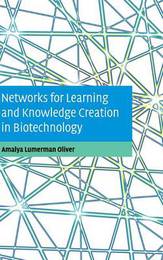
|
Networks for Learning and Knowledge Creation in Biotechnology
Hardback
Main Details
| Title |
Networks for Learning and Knowledge Creation in Biotechnology
|
| Authors and Contributors |
By (author) Amalya Lumerman Oliver
|
| Physical Properties |
| Format:Hardback | | Pages:272 | | Dimensions(mm): Height 234,Width 157 |
|
| Category/Genre | Organizational theory and behaviour |
|---|
| ISBN/Barcode |
9780521872485
|
| Classifications | Dewey:338.476606 |
|---|
| Audience | | Professional & Vocational | |
|---|
|
Publishing Details |
| Publisher |
Cambridge University Press
|
| Imprint |
Cambridge University Press
|
| Publication Date |
9 February 2009 |
| Publication Country |
United Kingdom
|
Description
Scientists in the biotechnology sector have developed a vast array of products and procedures, including drugs, diagnostics, agricultural products and veterinary procedures. This is made possible through various intra- and inter-organizational collaborations between the academic and private sectors, and through the establishment of networks for learning. In Networks for Learning and Knowledge Creation in Biotechnology, Amalya Lumerman Oliver shows how, in many respects, the organizational structure of the industry parallels one of its most important innovations - recombinant DNA (rDNA). She shows how the concept of recombination can be used to explain a number of organizational elements, including biotechnology firms, the form of university-based spin-offs, scientific entrepreneurship, and trust and contracts in learning collaborations and networks. The result is a stimulating account of how multiple theoretical perspectives can be used to understand the structure of the biotechnology industry.
Author Biography
Amalya Lumerman Oliver is Associate Professor of Organizational Sociology at The Hebrew University of Jerusalem, Israel.
ReviewsReview of the hardback: 'This book makes a major contribution to our understanding of how networks and entrepreneurial action drive innovation. The book should therefore be of great value for scholars who are working in this area, but also for researchers, students, and practitioners who are interested in knowledge-intensive industries where networks and entrepreneurship dominates innovation and knowledge creation.' Joseph Lampel, Professor of Strategic Management, Cass Business School Review of the hardback: 'This theoretical and empirical masterpiece impressively integrates multiple and cross-level analyses of new biotechnology firms. Amalya Oliver greatly extends our knowledge about intertwined networks among scientists, universities, start-ups, and big pharmas. Her rich and refined NBF model yields numerous unconventional insights into the tensions and dilemmas arising within learning alliances between academic norms about knowledge and market norms on profit. A judicious fusion of quantitative and qualitative methods discloses the centrality of trust relations for these managing the changing duality of competition and collaboration. Future analysts must reckon with this landmark study.' David Knoke, Professor Sociology, University of Minnesota Review of the hardback: 'This is a progress-assessing and agenda-creating book in a number of respects. It bolsters the case for the importance of university research, especially of the top scientists, in stimulating and providing the knowledge base for commercial application of biotechnology and other new breakthrough technologies. Clearly, this is a book that will be appreciated by all working in the area of new technologies for its value in setting a clear agenda for the field and in providing tools that advanced students need to understand the development of new areas in science, technology, and industry.' Lynne G. Zucker, Professor of Sociology and Public Policy, UCLA
|